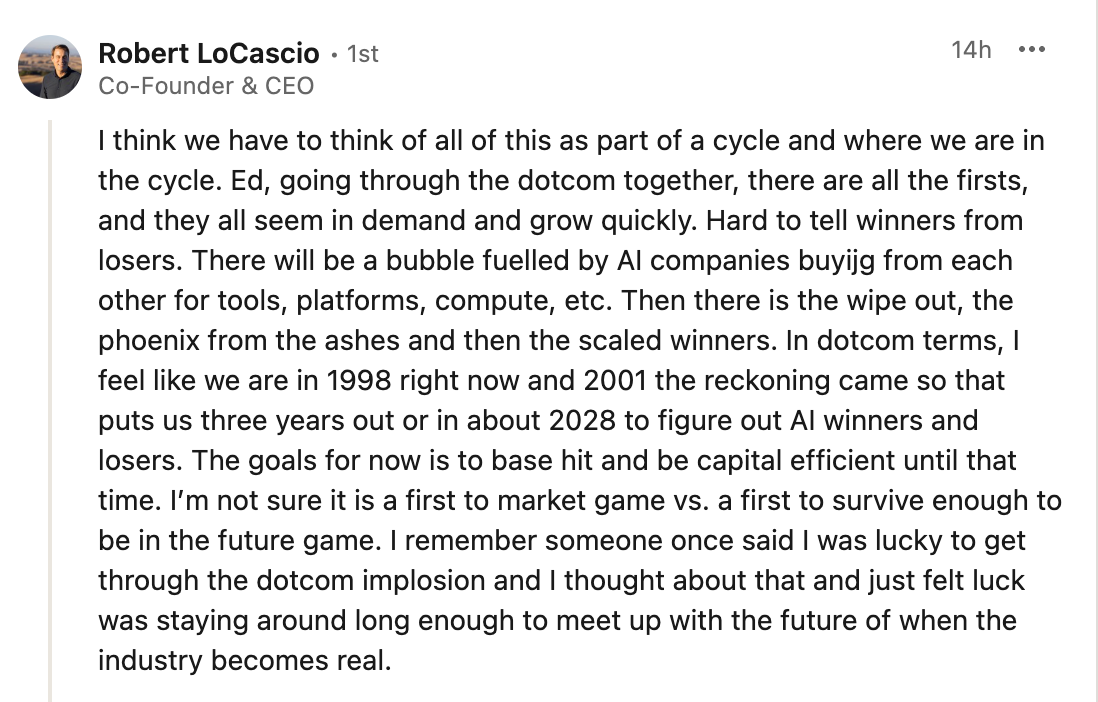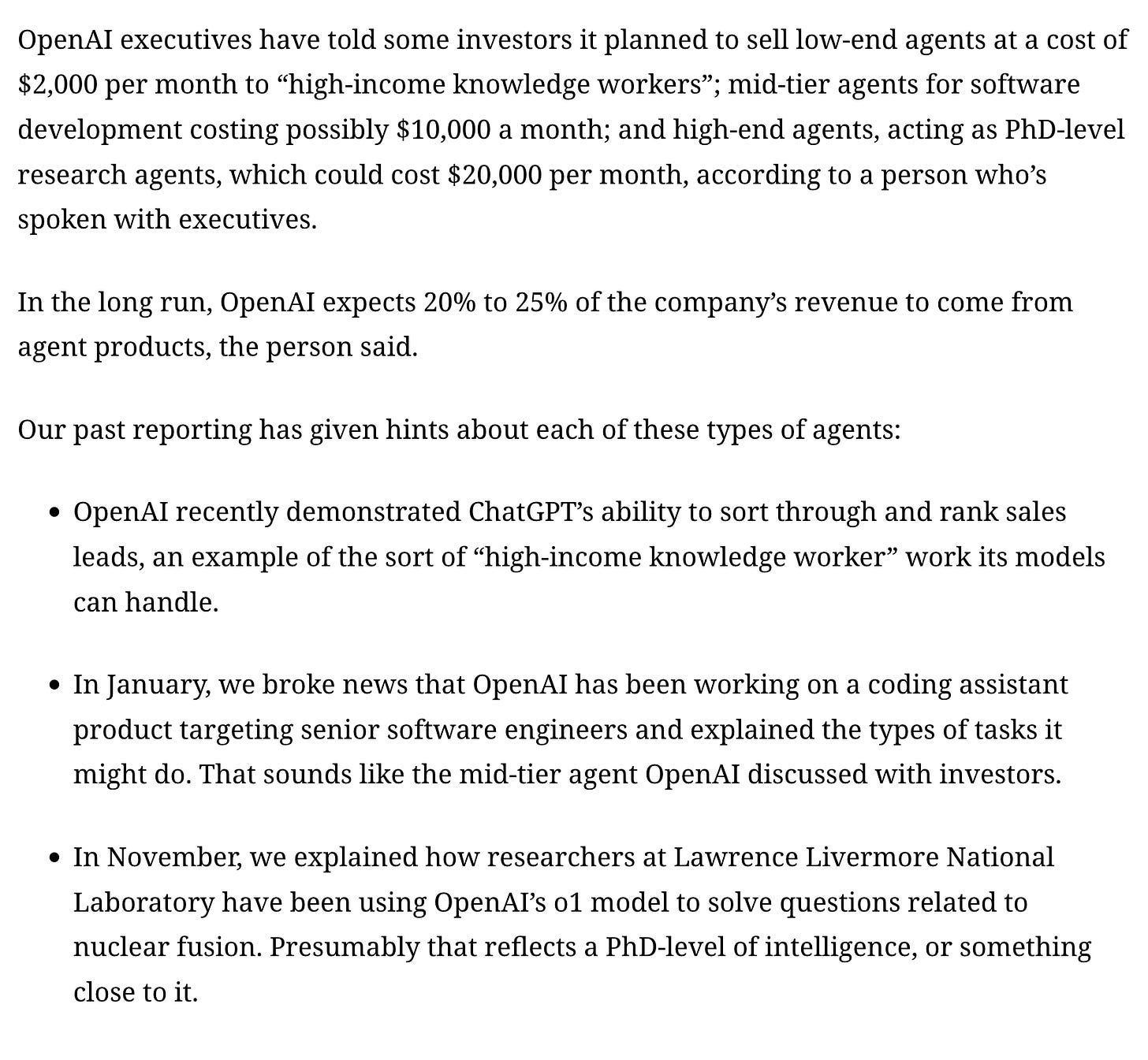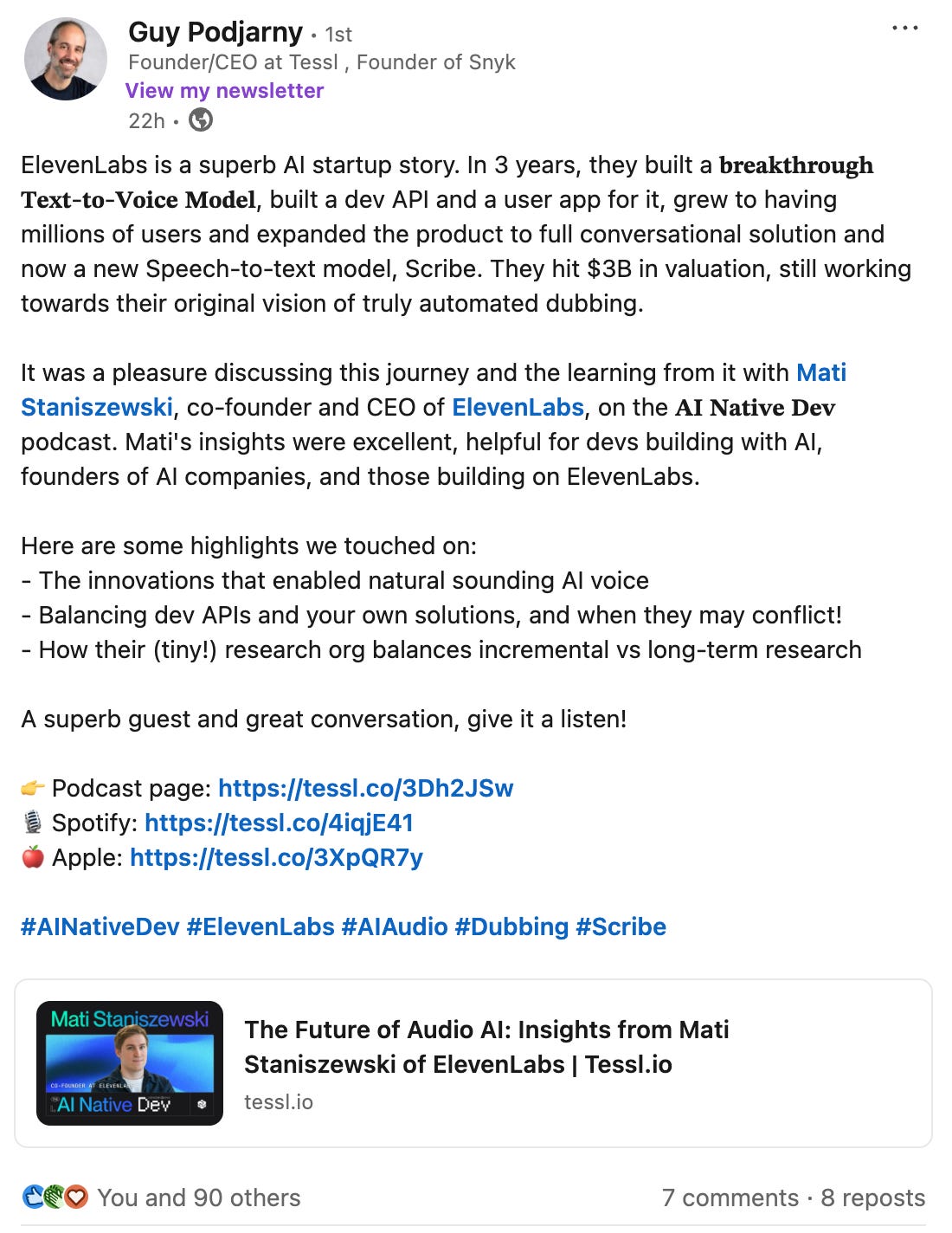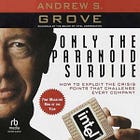What’s 🔥 in Enterprise IT/VC #436
Debating the future of SaaS + what many VCs are thinking...
This 👇🏼 - click through as lots of great comments.
Sebastian founder of Klarna who claimed the death of SaaS posted this on March 3 reiterating my point “Will the app stack of future just be a lakehouse where lots of smaller app databases just feed it and then agents and apps built on top?”
Later in the post he says that most won’t do this and put all data in a lakehouse or graph based database and because of that Salesforce as being the central repository is a likely scenario. Any how, click above and read the comments as they are enlightening!
Finally, I also posted the same thread on LinkedIn and wanted to share some of the comments which you can find if you click below. One of most thoughtful posts is from my friend Rob Locascio who founded LivePerson, the first customer support chat company. I’ve known Rob for a long time having led his very first round back in 1998 and serving on his board for a brief period of time while it was public.
Rob’s last point as a dot.com survivor who led LivePerson as a public company for 28 years is something we should all remember - “luck was staying around long enough to meet up with the future when the industry becomes real.”
Andrew Ettinger who has scaled sales to $2B as a former CRO also has an interesting point when it comes to enterprise adoption.
As always, 🙏🏼 for reading and please share with your friends and colleagues.
Scaling Startups
#strong agree
#spot on…being a founder is a long and lonely journey, better have a big vision and mission to survive the 🎢 coming your way
#🤔 The end of YC - When engineers lose their edge by Benn Stencil - a must read
Moreover, this isn’t just some accidental selection bias; this is the whole point of Silicon Valley. Flagship incubators like Y Combinator are built on the thesis that a smart kid with a computer and summer internship at Goldman Sachs can outwit all of American Express. That’s not because the kid understands the needs of payment processors better than people at American Express, or has better ideas than they do; it’s because the kid can build their idea.
But what if anyone can? What if lots of people at American Express can build stuff? What if someone who’s been an architect for twenty years can make the design software they’ve always wanted? What if a veteran investment banker can write a program that automatically generates pitch books? What if a real writer makes a note-taking app? What if software is the levered ideas of experts?
Sure, the experts’ ideas might not always be better than ours. Sometimes they might get it wrong, and sometimes the Stanford kid will get it right. But if we begin comparing our ideas to theirs, and pitting the solutions designed by drive-by engineers against those built by a problem’s permanent residents, I suspect that we’ll realize that our ideas are awfully mediocre. We merely adopted the dark; other people were born in it...
Well, no, that is all a little bit too extreme. Bolt and v0 aren’t that good, and you can’t vibe-code your way to a new payment processor; Cursor is not that accessible, and every barista can’t build a new point-of-sale system for their coffee shop. There are gradients to all of this.
But engineering execution is no longer as important as it once was. When wireframes build themselves, there is a lot less differentiation in better manufacturing. There is only the idea. There is only taste.Enterprise Tech
#was just a matter of time
#💯 exactly what we’ve been thinking about here at boldstart - second order effects when thousands of agents running amok in enterprises! My comment included below as well - lively 🧵 to check out
#👀 - The Information
#taking AI and going into vertical markets like clinical workflows - going to kill lots of startups there for sure
#do you want a roomful of Einsteins - quite cool to give everyone that level of knowledge but how will any one question the status quo? (Thomas Wolf - cofounder of Hugging Face)
However, real scientific breakthroughs will come not from answering known questions, but from asking challenging new questions and questioning common conceptions and previous ideas.
Remember Douglas Adams' Hitchhiker's Guide? The answer is apparently 42, but nobody knows the right question. That's research in a nutshell.
In my opinion this is one of the reasons LLMs, while they already have all of humanity's knowledge in memory, haven't generated any new knowledge by connecting previously unrelated facts. They're mostly doing "manifold filling" at the moment - filling in the interpolation gaps between what humans already know, somehow treating knowledge as an intangible fabric of reality.
We're currently building very obedient students, not revolutionaries. This is perfect for today’s main goal in the field of creating great assistants and overly compliant helpers. But until we find a way to incentivize them to question their knowledge and propose ideas that potentially go against past training data, they won't give us scientific revolutions yet.
If we want scientific breakthroughs, we should probably explore how we’re currently measuring the performance of AI models and move to a measure of knowledge and reasoning able to test if scientific AI models can for instance:
- Challenge their own training data knowledge
- Take bold counterfactual approaches
- Make general proposals based on tiny hints
- Ask non-obvious questions that lead to new research paths
We don't need an A+ student who can answer every question with general knowledge. We need a B student who sees and questions what everyone else missed.#so many options 🤯 - read comments
#how we work is changing…
#another great description of what MCP is…
#great podcast as ElevenLabs grew from $0 to over $100M in ARR in 3 years 😲 - goes deep into tech and product, how engineering teams are organized…
#Moats in AI - Perplexity founder and CEO - just keep shipping (fortune term sheet)
“I have a choice? This whole field is moving at a fast pace, and I think the only way to stay relevant right now is to ship better at that pace,” Srinivas said. “It’s good and bad, right? It’s bad, because there’s no hope to have several hours of sleep and a relaxed life. But it’s good, because you get to enjoy…the constant iteration of the product.” (Perplexity has a business relationship with Fortune).covered this topic in depth a few weeks ago in #432
#The AI SDLC if you will - how we ship code and organize is all being rewritten - great comments in 🧵
#how large enterprises like JPM are thinking about agents…from portfolio co Oakie
#new coding agent raised $125M out of gates, $25M + $105M (Bloomberg(
Markets
#😲 Anthropic raises Series E at $61.5B post-money valuation - $3.5B raised from the mega funds + strategics (company blog post)
Anthropic has raised $3.5 billion at a $61.5 billion post-money valuation. The round was led by Lightspeed Venture Partners, with participation from Bessemer Venture Partners, Cisco Investments, D1 Capital Partners, Fidelity Management & Research Company, General Catalyst, Jane Street, Menlo Ventures and Salesforce Ventures, among other new and existing investors.#Coreweave files for IPO - insane growth
#amazing outcome for Weights and Biases as CoreWeave to purchase for $1.7B 🤯 - btw, Coatue on both cap tables 🤔 - revenue is unknown but from what I hear this is a hefty multiple!




















